
Choosing the right domain name is a critical factor when it comes to the success of your new website project. There is a lot riding on your name and you’re going to be stuck with it for a while so you need to make sure you pick the right one.
If you’re serious about wanting to find the perfect domain for your new project, you need to know what to look for, what to stay away from, and where you can find hidden gems.
So, before jumping in and grabbing your new – or next – domain let’s dig in to a few things you need to know when it comes to picking the right one for your site.
Today I’m going to give you the details on how to find the perfect domain name for your project, help you avoid some pitfalls that you may not see coming until you’re way too far down the road, and have to do a lot of leg work to correct, as it was for me on one of my biggest projects.
You ready?
Questions to Ask Self when Choosing a Domain Name
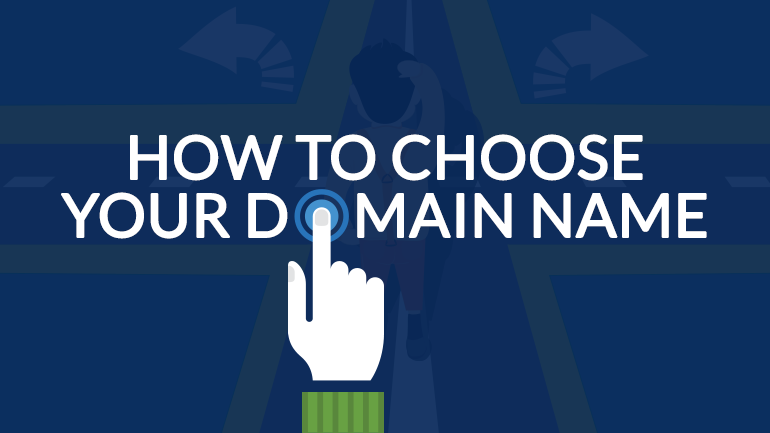 I registered my first domain name in 2004. That domain was the first of what would be many domain purchases I’ve made over the years.
I registered my first domain name in 2004. That domain was the first of what would be many domain purchases I’ve made over the years.
I’ve bought domains for personal branding, for business ideas, for niche sites, and several others just because they struck me at the moment as being something unique that I could make use of at some point.
Picking a domain for your site brings up some intriguing challenges:
- What kind of website am I going to build?
- How should I spell it?
- What should I do about numbers?
- Do I need a .com?
- and many more…
There are a lot of options to choose from, and places to look to find the perfect domain for your site, so let’s take a look at the factors we need to consider when choosing a domain name.
What kind of website am I going to build?
I think it’s important, before we get in to all this, to talk a bit about what kind of site you’re creating. The things I point out here will work for any kind of site, but it’s important to have a clear idea for what you’re planning on building before digging in to that.
So let’s take a look at a couple different types of site you may be thinking about.
How do I choose a domain name for my business?
Using your business name as your domain is a no-brainer if you’re building a site for your business.
Why?
Because that’s how people know you. You’ve printed your business name on your business cards, you’ve painted it on your signs if you have a brick and mortar location, and it’s probably how you introduce yourself when the phone rings.
But just as important is that if someone is searching for you in a search engine they’re going to use your business name in the search and you want to rank well for your own business name.
If your business name is common then it will be challenging if not impossible to get your business name as your main domain. However, with a little creativity you can find a .com domain that will serve you well. More on why a .com is important in just a minute.
brands with their names in the domain
If you’re working on building your expertise in a particular area then you need to think about creating your domain based what that brand is.
What is a personal brand? The idea of personal branding picked up steam with an article by Tom Peters called “the Brand of You”. He points out that we’re all CEOs of our own brand and it’s up to us to establish that brand and the value it delivers.
When it comes to choosing a domain think about the market where you’re trying to build your personal brand. There is a lot of great opportunity to find some great domain combinations using terms from your area of expertise.
Here are a couple great examples of personal brands:
There is another aspect of personal branding though. Not every personal brand needs to be built on a subject matter-based name. A lot of personal brands are built on one’s own name.
- MichaelHyatt.com
- ChrisDucker.com
This is a good idea if your content is going to cover more areas than just your personal area of expertise. It’s an option that can give you a little more wiggle room when it comes to the content you produce. For example, if you have a fitness-based site, but want to incorporate content from other areas that won’t really fit into a blog with a fitness-based domain, building under your personal name would be a way to go.
There are good arguments for either approach. Think through what kind of content you’re planning on building and make the choice that fits best for you.

Why You Need A .com
Say you’re in a conversation with a potential client, and you give them your domain verbally because you’re in a hurry and don’t have any business cards with you. You quickly blurt out your domain followed by .us, or .info. It’s a very easy mistake that I’ve seen many, many times, for that potential client to enter the .com because they’re everywhere and it’s easy to drop a .com at the end of your domain by accident. You’ve just inadvertently sent them to another site that could be your competitor or something entirely unrelated.
Many of the most memorable domains end in .com. But don’t let that stop you if you find something that fits really well, is memorable, and works for your brand.
9 factors to consider when choosing your domain name
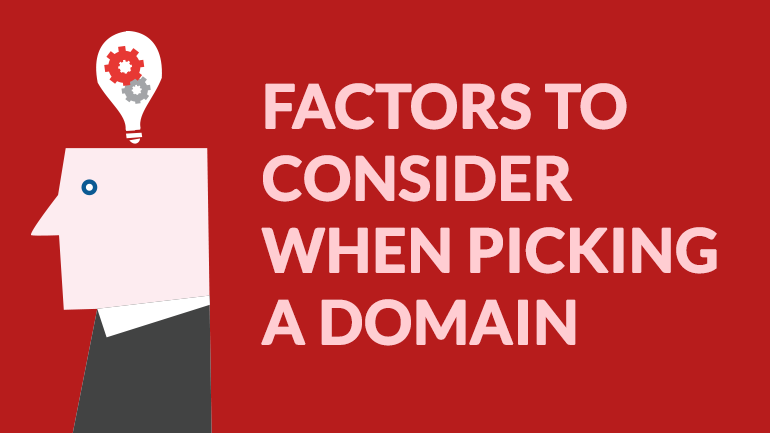
There are a lot of factors take into consideration when you’re looking at domain name ideas. You’ll be living with this choice for a while, so make sure you think through each factor carefully and make a good decision based on what you’re long term goals are.
1. Think About Finding Something Unique And Catchy
Think outside the box when you choose your domain name. Find something witty, funny or catchy.
Find some relevant words or phrases that fit your project. Brainstorm all kinds of ideas to see what you can come up with.
One of the most important factors is you want to have a memorable domain, so approaching it from a unique perspective can give you some additional ideas to choose from.
2. Make it memorable
You want your domain to memorable. You want it to stand out. When you tell someone about your website you want it to stick with them, so make sure your domain name is memorable.
3. Make it brandable
It follows very naturally that if your domain is memorable that you will also want it to be brandable. When someone hears your domain you want it to instantly call to mind who you are and what you stand for.
Think about some of the big domains you know and what comes to mind when you think of them:
- Amazon.com – everything you need from A to Z
- Google.com – the world’s biggest and best search engine
- Yahoo.com – search and news site
- Facebook.com – the greatest of the social media giants
- Reddit.com – social news, discussions, and community
Whatever you choose, think of this domain as the place where you’re going to build your brand.
4. Make sure it’s easy to communicate verbally
One of our principles here is to be creative, but be careful about getting carried away. One of the things you want to think about when it comes to your new domain is that you want it to be pronounceable. Think about using easy-to-use words in your name so that it rolls off your tongue and people know what you’re talking about.
If they can’t pronounce it, it’s not really as memorable as it could be, is it? They may just remember that it was that crazy domain name they couldn’t pronounce and will have a hard time getting it into their web browser.
5. Choose a domain that’s easy to spell
Keeping things simple here is the rule. Your domain name needs to be memorable, and creative, but it also needs to be easy to spell. I changed the entire branding of my web design and development business because I thought a witty spelling would be a great place to build a brand. Instead, I found myself constantly explaining the spelling and that got really old.
6. Make it short
Short domains aren’t always easy to come by these days, but the shorter they are the easier they’ll be to remember, and being easy to remember is one of our keys. Try to keep it as short as you can.
7. Make sure it describes your website
When you’re building a brand, you want everything you can get to add value to that brand. It’s not always easy to nail all the criteria laid out here, but it’s well worth the time and effort and research to get one that fits well.
You will know that you’ve found the right domain name when it fits like a glove and is descriptive. Think about it in terms of the benefit you are offering to your visitors. We’ve covered short, easy to spell, pronounceable, etc. Once you’ve nailed those put it through the filter of how well it describes your site.
8. Spend some cash in your domain. It’s worth it.
Don’t shrink back from spending a little money on your domain. A lot of times when someone sees a domain has been registered they head back to the registrar to see if something else is available without ever thinking that they could possibly get their first choice at a reasonable price.
If the domain you want is already registered by someone else, don’t be discouraged. If the person who registered the domain isn’t using it, consider making an offer. Build a budget for it into your plans. Don’t let a couple hundred bucks stand between you and the perfect domain.
You may be pleasantly surprised. Sometimes owners will accept reasonable offers because they may just be ready to move on from that domain. You help them clear inventory, and you get the domain you’re looking for – it can be a win/win so don’t be discouraged if it’s registered when you’re doing your search.
9. Consider the social handles
You will want to check to see if the social handles are available for your domain. This will go a long way to help make sure you’re presenting a consistent brand on all platforms.
Before you click that “buy now” link, make sure your domain take some time to consider where you plan to build your following on social media and see if that name is available.
It may be a challenge to find something so cohesive across all channels, but it’s worth thinking through so you can create a consistent brand for your project.
A great tool to help you find out what’s available quickly is a site called knowem.com. That site will let you search tons of social media platforms to find out what user names are available.
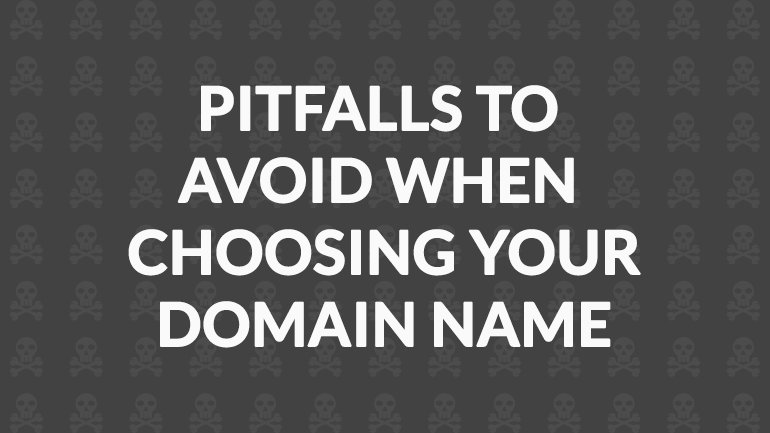
6 deadly pitfalls to avoid when choosing your domain name
As much as the things we’ve discussed so far are important, there are also a few things that you will want to avoid when picking your new domain name that are just as important.
1. Don’t pick a domain that you have to explain
I mentioned this previously when discussing the brand name I used previously for my web design and development business. It gets tiresome and just really isn’t a good brand if you have to do a bunch of explaining every time you talk to someone about your website.
You don’t want to have to be explaining how to spell it, why you spelled it the way you did, what that combination of characters you chose is supposed to mean over and over again. Pick something you don’t have to explain all the time.
2. Stay away from unclear meanings
A couple years ago it seems there was a mad rush to grab domains that and try to build them into brands. While the letters were pronounceable, they made no sense and were related to no word in the English language, or most others either.
Another pitfall you want to avoid is unfortunate word combinations. Here are a couple examples of unfortunate combinations to illustrate the point. Yes – these were real – or still are – real sites.
- Pen Island
- Speed Of Art
- Experts Exchange
- Therapist Finder
- Teachers Talking
All you have to do is combine those words together, put a .com at the end, and see how they look in your browser to see what the problem is. So, make sure you write it out and see what it looks like. Sometimes when you combine words you can end up with some rather unfortunate and offensive results.
3. Hyphens and numerals are a bad idea
Numbers and hyphens are a bad idea when it comes to domains. They’re hard to communicate and violate the criteria discussed above. In addition, they really don’t look good on a business card and they carry with them the stigma of not being very well thought out.
Think about how your potential visitor would view such a domain. It’s got hyphens, and it’s long. Does that present the professional image you want your new site to demonstrate? Probably not.
Numbers are an even bigger problem. Do you spell them out, or just use numerals? Do you have to explain them when you’re trying to communicate them verbally? It’s better to stay away if you can avoid them.
The only exception I can think of is if the numerals are part of your brand like 48 Days, Blink 182, or 37 Signals. If your business is branded like this, then numerals make perfect sense, and it would be intuitive for users to find your domain that way.
4. Avoid trademarked names
It should go without saying that registering a domain that uses someone else’s intellectual property is off limits. However, it happens. And often. If the phrase you want to register is trademarked, copyrighted, or has any other kind of legal protection on their name it’s best to save yourself the trouble and stay away.
If you’re not sure, take the time to do your homework. I have a client who registered a domain for a phrase that you might think would have been fine to use for his project, only to find out that was not the case. He received a cease and desist order via mail that required him to surrender the domain to the trademark holder. Luckily, that was all.
5. Exact match domain names are not always good
This one is a bit tricky. Exact match domains are those domain names where you have a word-for-word exact match for a keyword target. At one time, this was a huge win. If you had an exact match domain name for your primary keyword on your site the search engines saw you in an extremely favorable light and it was easy to rank.
However, that is no longer the case, and in some instances, an exact match domain may not be helpful, but could actually be hurtful to your site.
The main point here is that you’d rather have a domain that matches up with the best practices mentioned above, and that isn’t necessarily going to lend itself to an exact match domain name.
However, the tricky part comes when an exact match domain is your legitimate business name. If you have high-quality content on your site and your brand is an exact match, then it may be ok, but I think that picking a domain that is brandable, memorable, and easy to communicate would be a better option.
6. Stay away from long domain names
I’ve seen long domain names that basically spell out a sentence or a phrase. There may be a time or place for these like if you’re running a promotion and the phrase is a perfect fit and it’s easier to communicate than saying something like “find more info at mydomain.com/our-promotions/latest-promotion.html.”
But otherwise, long domains can be a serious pain. They aren’t easy or clear to communicate and it’s easy to forget a simple preposition in the phrase which could send your potential visitor somewhere else entirely.
They’re also a problem in instances where you have character limitations, like social media.
Avoid long domains in favor of something that’s short.
Buying Premium Domains
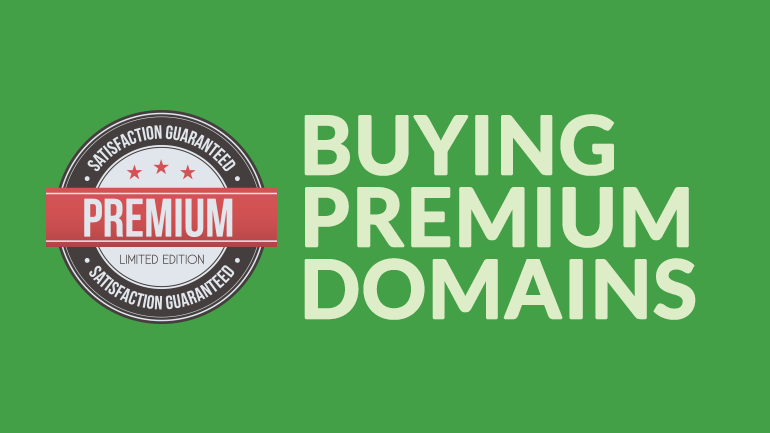
Sometimes the domain name you choose is already registered, as mentioned previously. However, don’t let that stop you.
Buying your domain name from someone else is a great way to get that perfect domain you’re searching for, but wasn’t available for registration on Godaddy.
Premium domains are those that show up with those big price tags when you’re searching or have some sort of “parking” page where the owner may be offering it for sale, or perhaps trying to get a little ad revenue.
Many times you can make an offer right through the parked page. Some registrars have a buying service that they offer for a fee where they help you get your domain.
Premium domain prices run from a couple hundred dollars to hundreds of thousands of dollars, so it really depends on what you’re looking for.
However, it’s worth making an offer that you’re comfortable with. It could be that the price you’re willing to pay for the domain is what the owner is willing to sell it for just to be rid of it. It doesn’t hurt to take that first step and make a low offer. Just be prepared to negotiate with the owner, and if in the end, the price is greater than you’re comfortable with, then you can walk away.
When it comes to a premium domain, think about it as if it’s one of the start-up costs for your business. I’ve purchased premium domains before, and you may be surprised at what kind of deal you can get.
When you are looking at a premium domain it’s also important to make sure that there are no negative marks associated with it from previous owners. Make sure it’s not been de-indexed by Google. Make sure that it’s not full of spammy backlinks that will get your site unwanted negative attention from Google.
Get ideas for great domain names
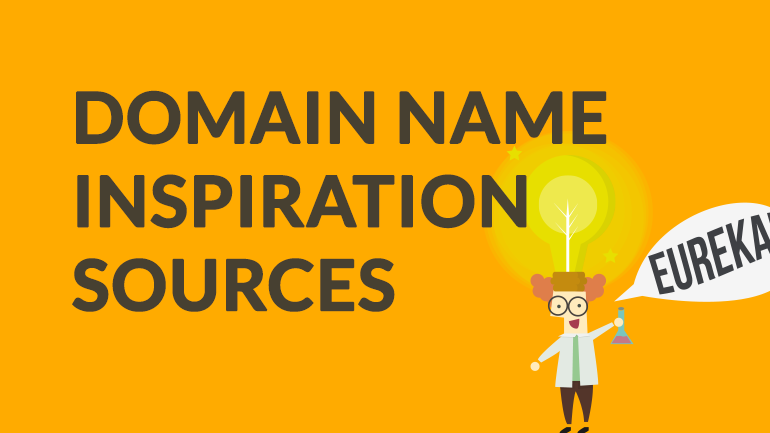
So we’ve covered a lot so far. You’ve got a few ideas, but you need some inspiration. Here are a few sources where you can generate some ideas for your domain name
- Domain Tools – Find some great suggestions by starting with your idea, or keyword ideas
- Domainr – Great resource that will give you results for all kinds of options for TLDs
- Panabee – Gives you some creative choices that may – or may not – work for you
- NameMesh – Generates some creative ideas based on keywords you input
Buying Expired Domains – Pros & Cons
Is buying expired domain names a good idea?
Buying a domain name that just expired is a great way to find a domain name. I’ve bought several this way. You will want to do your due diligence when you buy domains this way as you would when buying a premium domain because the reason that it was dropped by the previous owner could be that it was de-indexed by the search engines or some other negative reason.
However, that’s not always the case. A lot of times, people just let go of old domains they have no intention of using, and can’t justify spending the money on to keep it registered any longer.
Catching a domain just as it expires can be challenging though. There are a lot of different ways domains expire, and my intent isn’t to cover that here. For our purposes, an expired domain is one that’s found its way back into the available pool of domains and has been picked up by a business that focuses on selling these recently dropped domains.
These domains are usually much less expensive than the premium domain names we discussed earlier.
Here are a few sources you can use to search for expired domain names.
JustDropped.com – This is my personal favorite. I’ve used this site to buy several high quality expired domains. You can subscribe to their newsletter and get a list of new domains that have just dropped sent to you.
ExpiredDomains.net – This is a great source for finding a domain. There are tons of options here for researching the perfect domain name. I’ve spent several hours researching domains on this site for niche site projects.
FreshDrop.com – This is another great option for researching domains. This is a great tool with a simple and easy to understand interface. The free version will be fine for basic searches and research, but if you want to dig deeper the pro version ($32.95 per month) may be right for you.
A Couple More Domains You MUST Register
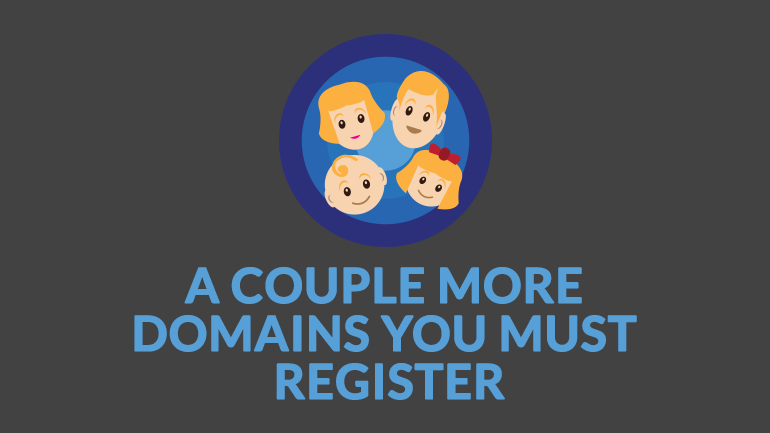
Ok – I admit it. I’m a bit of a domain collector. It may be a moment when inspiration strikes, or it’s an idea for a product or service I want to create, or just because it’s a domain that strikes me for one reason or another.
So, if you’re a collector like me, and you’re registering something new and you’ve not picked these up you will want to take a look to see if these are available before you check out. If they are, then you need to make sure that you’ve got registered no matter what.
Your kid’s names
If you’ve got young children I recommend highly to get their personal names registered. It may be several years before the domain gets used, but it will be great to have it once they’re old enough to make use of it.
Maybe they will want to use it for a school project. Or maybe they want to create a blog or some kind of cool online project that you can work on with them. Whatever it is, it’s vital to get those domains registered.
Your Spouse’s Name
Similar to having domain names reserved for your kids, it’s important to get your spouse’s domain registered too. Even if your spouse couldn’t possibly care less about being online there may be a time when they’re looking to make a career switch and an online resume would be something to help them set themselves apart from the crowd. Trust me – as one who’s looked at a lot of resumes over the years, a really well-done resume site can go a long way to make you memorable, but I digress…
Family Name
This one may be hard to come by, but it’s worth a shot to see if you’re family name is available.
Variants Of Your Primary Domain Name – .com, .net, .us
If you haven’t done so already, register all the possible variants of your business’ name with all the top level domains – .net, .com, and .us. If you could possibly have variant spellings for your business grab them too.
A great example is Dan Miller’s 48days.com. If you check the possible variants of that domain you’ll see he’s got them all and they’re all pointed to his various web properties site.
Your Social Handle
You’re already at least partially assured of it being available being that you’ve chosen it as your username on various social sites across the web.
Paul Boag is a great example of this. Paul is @Boagworld on Twitter and his site is at Boagworld.com.
Jeff Robbins is another great example. He’s on Twitter @jjeff, and the same for his personal site, jjeff.com.
If you’ve chosen a username that you use from site to site then it’s a good idea to have it registered so that it’s available to you should you ever decide to do something with it. Plus, having a universal username makes it easier for people to remember you, carries your persona from site to site, and establishes your credibility and fields of interest and expertise.
You don’t want someone else trading on your name. Unfortunately, there are unscrupulous people who will do their best to ride on the coattails of your hard-won success.
And you never know what future use a domain name may have. I’ve got numerous domains that I’ve registered for this very purpose (along with available variants). So make sure you have these locked up.
Private Registration Or Not?
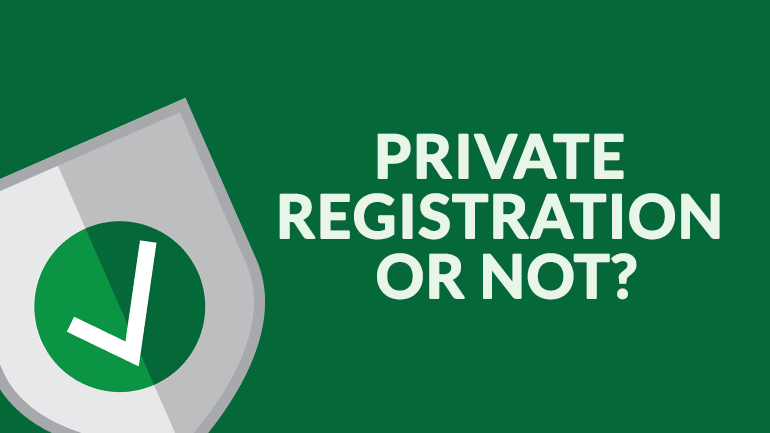
When you register a domain name, you include a bunch of personal information that is associated with your registration. This is stuff like your mailing address, phone number, and other personal contact information.
Not everyone is comfortable with having that information out there. And by “out there” I mean in the Whois database.
Every time you register a new domain it asks you for a bunch of personal information, just like most any account you sign up for. The difference between most accounts and domain name registration is that when you buy a new domain the registrar is required to register that information with ICANN – the “Internet Corporation for Assigned Names and Numbers”. To make a long story short, they’re the organization who is responsible for managing the domain name system.
The Whois database contains those registration details for domain registrations and is searchable by anyone. It’s a bit like an old-fashioned white pages entry in a phone book that had your landline phone number and your street address.
Back in the dark ages, before the internet, the local phone company would deliver these giant tomes to your door and the first part of that book was a listing all names and numbers that had phone service. You could pay a little extra to have your information unlisted, and you wouldn’t appear in the book, although the phone company still had your information.
You can think of the Whois database in the same way for domain names, applied globally.
So if you’re not comfortable with having your information out there for whatever reason, it’s a good idea to opt for the private registration. It usually only runs roughly $10 or so which is a good deal.
Conclusion
You’re going to be working with your domain for a long time so it’s important to get things right when you’re picking one. It’s important to get the right one you won’t end up regret or one that you will end up needing to change in a couple years.
You want it to be memorable, to represent your project in the best possible way, and be an asset to your project.
Stay away from things that make your domain name confusing like numbers, hyphens and long names.
When you’re registering a domain remember to pick up the variations for other TLDs like .net, .org, and us and pick up the ones for your family that you may need some day.
Doesn’t matter what kind of site you’re creating there is a perfect domain out there for you. You may just have to do a little digging to find it.
Click here to get access to a free checklist for a concise guide to helping you pick your best domain name ever.